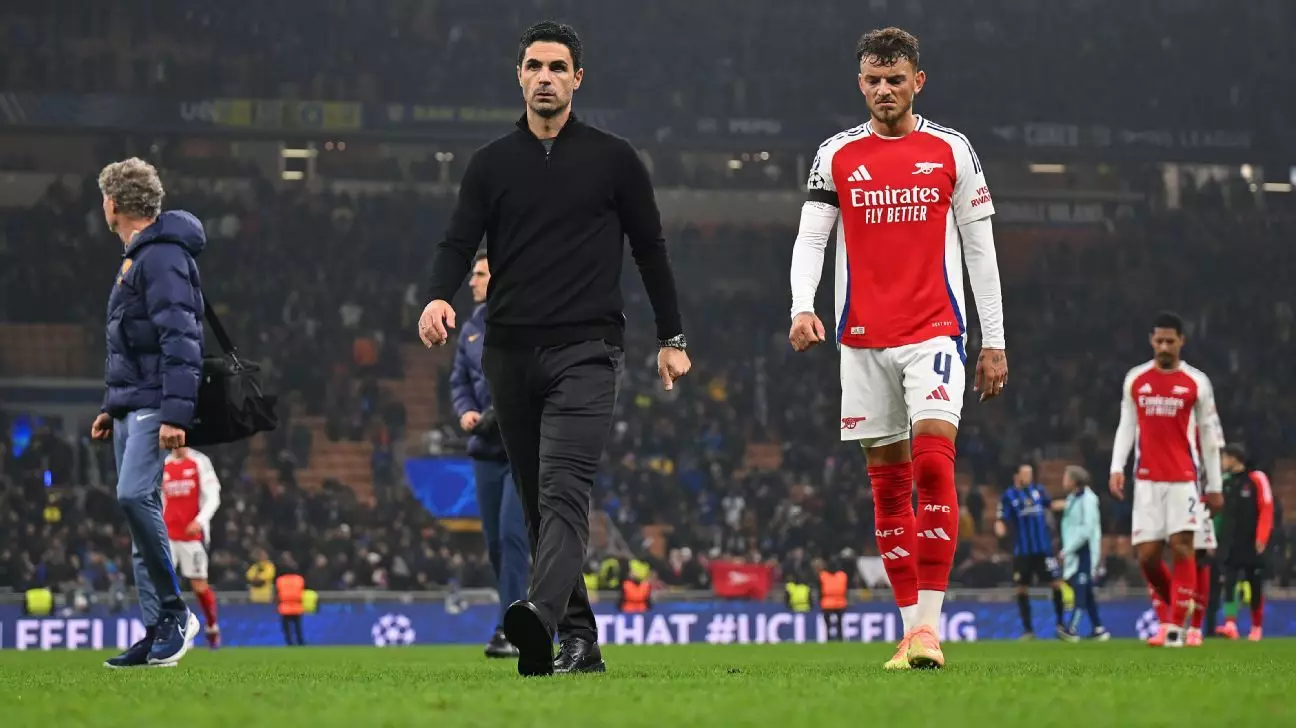The landscape of English football is ever-changing, with clubs experiencing wild swings of fortune. Arsenal, traditionally a giant of the Premier League, is currently navigating turbulent waters. The recent 1-0 defeat to Internazionale in the UEFA Champions League has cast a shadow over their ambitions this season. Although the defeat is not catastrophic for their European hopes, it adds to a challenging narrative that entails a concerning dip in form in the league and significant organizational instability following the unexpected departure of sporting director Edu Gaspar. As the Gunners find themselves struggling to maintain their place in the Premier League’s upper echelons, questions arise about their ability to contend for honors this season.
The challenges Arsenal faces are not limited to the game itself. Just days after the Inter defeat, the club was rocked by Gaspar’s exit, forcing fans and pundits alike to speculate about the implications for the club’s strategy and stability at a critical juncture. It is surprising how swiftly fortunes can change in football, and Arsenal’s current turmoil starkly contrasts their previous methodical progress under manager Mikel Arteta.
At the same time, the players on the pitch are struggling to find their rhythm. Injuries have disrupted the squad’s chemistry, diminishing their effectiveness at both ends of the pitch. Mikel Arteta’s frustration was palpable in the aftermath of the match against Internazionale, particularly regarding controversial officiating decisions. The penalty granted to the Italian side, despite the apparent ambiguity, further accentuated the thin margins that often dictate the outcomes of crucial matches. Merino, the Arsenal player involved in the penalty shout, may have had a case, but such nuances often escape the referee’s gaze in high-stakes scenarios.
As Arsenal transitions through this turbulent phase, their tactical approach increasingly comes into question. Against Inter, Arsenal dominated the ball yet struggled to convert possession into meaningful scoring opportunities. Arteta’s implemented tactics, while often effective, may lack adaptability in the current context. The Gunners attempted a barrage of crosses, totaling 46, showcasing an inclination to play in a very predictable manner. Such tactics may no longer yield results if opposing teams implement a resolute defensive posture, as Internazionale successfully demonstrated.
Arteta showed optimism when reflecting on the match, suggesting that the performance leaves something to build upon. However, one must wonder about the efficacy of such positivity in the face of tangible results. The manager’s assertion that this match was their best in recent years in Europe feels like a stretch, albeit one made to rally his players. The reality is, amid dazzling moments, there remains a gaping void in clinical finishing and the offensive creativity needed to unlock steadfast defenses.
A critical analysis of Arsenal’s attacking options reveals why recent criticism regarding squad depth is growing louder. The struggles of key players like Gabriel Martinelli and Kai Havertz render the attack unpredictable, lacking the sharpness and flair expected from a team with aspirations of challenging at the top. Havertz, in particular, has not found his footing after transitioning from Chelsea, often appearing lost on the field.
Adding to the pressure, Arsenal’s captain Martin Ødegaard made a late-game return from injury, yet the timing did not favor any impactful contribution. While Ødegaard’s creativity is greatly missed, one can’t help but question whether his return could swiftly reinvigorate a team in need of a tuneful rhythm. Given that he was sidelined for nearly two months, expecting him to be a game-changer immediately may be overly optimistic.
Arsenal’s current predicament paints a concerning picture, with three defeats over the last six matches, including back-to-back losses. For a club rooted in ambition and rich history, this is a moment requiring introspection and quick strategic recalibration. With their resilience tested, the Gunners have an upcoming pivotal clash against Chelsea, which could serve as a turning point in their campaign.
Arteta’s confidence in the squad’s potential is commendable, but it ultimately needs demonstrable results to vindicate it. Arsenal’s undeniable talent must translate into performance, or the vagaries of uncertainty could deepen into something more ominous. In football, nothing ever stays the same for too long; it remains to be seen whether the Gunners will rise to meet their challenges head-on or falter under increasing pressure. The time for decisive action is upon them, as the stakes continue to climb both on and off the pitch.


Leave a Reply